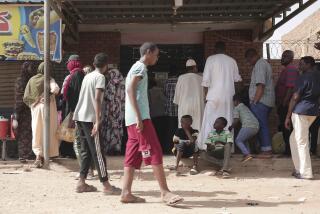Pressure on Sudan to End Crisis Grows
- Share via
NAIROBI, Kenya — Rapes and atrocities are continuing in Sudan’s Darfur region and the government’s claim that it is acting to stop the violence is not credible, Human Rights Watch said in a report to be released today.
The report is the second this week by an international rights group. On Monday, Amnesty International called on the Sudanese government to stop arrests and intimidation of people who had told foreign delegations about the violence. It cited at least 47 cases, including men who spoke to Secretary of State Colin L. Powell during his visit in June.
Stepping up criticism of Sudan, Senate Majority Leader Bill Frist (R-Tenn.), on a visit to the region, described the events in Darfur, in the country’s west, as genocide. At a news conference Tuesday, he rejected a European Union finding this week that genocide was not unfolding.
Sudanese Foreign Minister Mustafa Osman Ismail said Monday that estimates by the United Nations that 30,000 to 50,000 people had died were grossly inflated. He said 5,000 had died, including 486 police. Hundreds of thousands of refugees need food and medicine.
“There is a humanitarian, security and political problem in Darfur as a result of the war that was started by the rebels for political reasons,” Ismail told reporters in Cairo.
The United Nations said the crisis in Darfur worsened Tuesday when the government carried out new helicopter gunship attacks against people it said were rebels.
The world body also said pro-government militias were carrying out fresh attacks on civilians. The violence caused more civilians to flee, according to a statement issued in Geneva by the U.N. Office for the Coordination of Humanitarian Affairs.
The United Nations also was critical of Sudanese authorities for increasing barriers to humanitarian aid, including delays in flights and the deployment of personnel.
Facing what it has called the worst humanitarian crisis in the world, the United Nations has given the Sudanese government 30 days to show it is serious about disarming the so-called janjaweed militias accused of atrocities in Darfur, after which penalties could be imposed.
Both Frist and the Human Rights Watch report, released Tuesday, expressed doubts about whether the international pressure would prompt the government to take action.
“Unless the government of Sudan acts, sanctions will not be sufficient. The government of Sudan can simply operate without the impact of those sanctions being felt,” Frist said. The senator visited Sudan but not Darfur.
“To date, while humanitarian access has improved significantly since April 2004, progress in the areas of human rights, security and political resolution remains minimal to nonexistent,” the Human Rights Watch report said.
“If the Sudanese government were serious about protecting civilians, it would welcome an increased international presence to help it stop the violence.”
The group reported that sexual crimes continued daily, and it quoted testimony of women who said they had been raped, stripped or whipped in June and July.
It cited a case in which several victims of the janjaweed were reportedly shackled together and burned to death.
In other findings, Human Rights Watch expressed concern that some militia members who might have committed atrocities were being integrated into the police and security forces overseeing displaced people in camps, and that some of those who had been tried and convicted appeared to be common criminals, not militia members guilty of atrocities.
It expressed alarm over a government plan agreed to with the United Nations to set up “safe areas” for the displaced, suggesting that could mean they would be housed indefinitely in areas with very poor facilities.
“The prospect of this resettlement plan and the notion of safe areas raises the concern that rather than being enabled to return to their homes and lands in safety and dignity, displaced civilians will be forced to remain in camps or permanently resettled in locations, effectively consolidating the ethnic cleansing that has taken place and further destroying their livelihoods,” the group said.
On Monday, Amnesty International called on the government to release those arrested for having spoken to foreign delegations and to ensure that anyone in Darfur be allowed to talk about the crisis without fear.
“Security services or the Sudanese army reportedly arrested at least 47 people between June 26 and August 3, mostly after these people spoke to members of foreign delegations. Among them are 15 men from the Abu Shouk camp, near Fasher, who were arrested by national security officers following U.S. Secretary of State Colin Powell’s visit to the camp on June 30,” the agency said in a statement.
Frist suggested that giving the government more time to disarm the militias would only hurt those villagers who have been driven from their homes.
“What is going on in Darfur is genocide. I disagree with the statement made by the European Union,” Frist said.
“I don’t think it takes 60 days or even 30 days [to disarm militias]. Giving them extra days to pursue their policy just contributes to this tragedy, only hurts refugees,” he said.
The U.S. Congress passed resolutions last month declaring genocide was underway in Darfur, although human rights organizations such as Human Rights Watch and Amnesty International have not used that term, instead calling it “ethnic cleansing.”
The State Department is investigating the situation.
More to Read
Sign up for Essential California
The most important California stories and recommendations in your inbox every morning.
You may occasionally receive promotional content from the Los Angeles Times.









